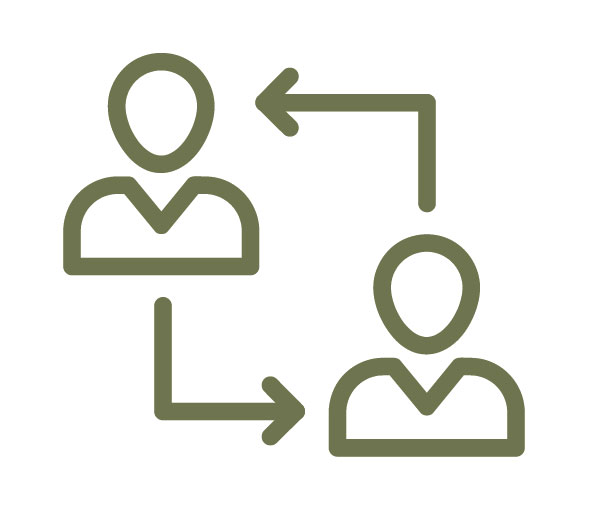Win
meets
Win
Nobody likes conflicts – they can damage working relationships and cost valuable time and energy.
But with the right approach, we can turn conflicts into opportunities to reinforce relationships. This is the essence of mediation methodology. Avoiding or ignoring conflicts will never get us anywhere. Fully understanding them and finding common ground in a non-adversarial atmosphere can unleash vast potential and creativity. The solution may be easier than you think! Win meets win.
“I support organizations in learning the right skills to deal with differences and develop better relationships with colleagues, customers, suppliers and business partners.
The result: companies become stronger, more successful and more enjoyable places to work.”
Conflicts are an inevitable part of life – especially in complex and competitive business environments. Mediation techniques raise the curtain and enable conflicting parties to understand the underlying mechanics, develop stronger relationships and achieve sustainable solutions.
Based on professional experience leading teams at major global companies reaching back to the early 2000s, Paula Gómez Perea has launched this platform to dedicate herself to supporting organizations in preventing, understanding and resolving conflicts.
Paula is Certified Mediator and a member of the German Association of Mediation (Bundesverband Mediation e.V.).
“In the interest of your interests – and those of your partner!”
Paula started her professional career in Germany in 1997 at a Japanese conglomerate. There, she got to know the Keiretsu culture, the corporate organization structure that developed in post-war Japan, and began to appreciate the different business cultures of Asian, North America and Europe.
Three years later she joined a globally operating German company, where she held several positions in key account management, strategic management consulting and marketing. After this company was acquired by a multinational corporation, Paula’s focus shifted to the integration of diverse teams and organizational cultures and projects in the areas of sustainability and digital business models.
During this time, she became even more attuned to the importance of cultural awareness and conflict management competencies as key factors for interaction, leadership and business success.
What
mediation is –
and isn’t
My mediation approach is termed “Interest-based Negotiation.” It aims at consensus rather than compromise. This distinction is important: every compromise demands that both parties give something up in the interest of reaching an agreement. Consensus, in contrast, establishes common ground. This doesn’t mean that sources of conflict are eliminated. A healthy consensus lays the foundation for resolution and/or acceptance of differences and the strengthening of long-term relationships.
Typical mediation cases:
Workplace mediation between colleagues or project team
Team mediation
Workplace mediation between manager and employee
Mediation between business partners
Mediation with customers or suppliers
“Mediation: It may begin with conflict, but it can still end in harmony.”
How does mediation work?
Acting as a neutral mediator, I help parties come to a resolution that each side values through a structured dialogue, on their own. At the same time, I encourage parties to share information, lower the emotional temperature and foster more effective communication. Rather than imposing a solution, I work with the conflicting sides to explore the underlying interests beneath their positions. Participants apply creativity to explore innovative means of coming together.
Intercultural issues
Cultural diversity is an additional potential source of conflict in globally operating companies, as culture affects all aspects of communication and management. Intercultural mediation helps parties understand cultural differences, it fosters cultural intelligence, builds trust and establishes a basis for more effective collaboration.
“Mediation can have a major impact on cultural awareness. It improves the way people from different cultural backgrounds work and act together – with positive effects on your bottom line.”
“Cultivating intercultural understanding – it’s not as difficult as it sometimes looks.”
Deal with differences more effectively
What could be better than conflict resolution? Conflict prevention! That’s why I support staff and management in learning mediation skills they can apply on a day-to-day basis. The new skills make companies and employees more successful and enable competitive advantages.
“Today’s most promising innovations and business opportunities require collaboration among people, functions, departments, organizations and business partners in a complex, global and diversified world. To realize them companies must get people working together effectively.”
The toolkit includes the Healthy Conflict Workshop and Intercultural Awareness Workshop as 1-on-1 coaching options.
Benefits:
Getting clarity about what is behind the curtain of a conflict
Becoming familiar with the typical reactions to conflicts
Understanding your conflict behavior
Learning to ask the right questions
Managing conflicts in a more effective way
Adopting pragmatic tools for developing sustainable solutions
Who benefits?
Leaders wanting to improve leadership skills
Project managers aiming for more effective team collaboration
Customer-facing managers seeking to build stronger relationships with customers
Ambitious talents who want to make a difference
Any professional in an organizational environment
Mediation for stronger business relationships
In the same spirit as learning conflict prevention skills to enhance the performance and resilience of your organization, mediation between two or more parties can be carried out in the startup process or before entering into a business partnership. With the help of a neutral third party and following a structured procedure, participants set the stage for future collaboration and achieve a better mutual understanding of interests and expectations, while building trust and making future conflicts less likely.
“I recommend that every entrepreneur carry out a mediation process with future partners before founding a startup. Making sure that we understand each other’s interests, needs and motivations, clarifying the way we want to work together and getting the tools for managing diversity are essential steps.”
Typical mediation cases:
Team mediation to create team identity, build trust and define the way of working together in the future
Mediation between business partners to clarify expectations, roles, responsibilities and partnership decision-making
Sharing experience
Mediation is a comparatively new approach to conflict resolution, and subject to constant change. I see teaching activities at universities as part of a personal learning process. While my extensive practical experience forms the basis of my teaching, maintaining an active exchange with faculty and students helps keep me up-to-date.
Fresenius University of Applied Sciences
Teaching “International Management” in the M.A. Digital Management, since March 2021. The module includes conflict management and mediation.
Dortmund University of Applied Sciences
Teaching module on “Conflict Resolution and Mediation” for B.A. students of Applied Social Sciences, since September 2021.
Universidad Complutense de Madrid
“Multinational Culture” Guest Lecture in the M.A. International Business Management, since 2018.
Service
overview
1. Solving or preventing conflicts
Mediation between two parties
When two parties disagree about the best solution and path forward, the result is often a seemingly insurmountable impasse. There’s a better way! By seeking common ground and building on it, conflict parties can find viable solutions that don’t require anyone to “cave in.”
Group mediation
Groups often have their own special dynamics, with different pushing hidden agendas forward. A skilled and neutral external view can establish the needed clarity.
Intercultural mediation
Different cultures are not mysterious black boxes! The literature on intercultural studies looks at cultures in terms of dimensions based on values and tacit assumptions. These underlying aspects are generally much more closely aligned than meets the eye.
2. Learning how to deal with differences more effectively
Happy conflicts workshop
Whether groups or classic two-party conflicts, understanding the nature of the conflict is the first step.
Intercultural awareness workshop
By building knowledge of cultural dimensions and how they function, we can lay the foundations for better intercultural harmony.
1-on-1 coaching
Individual coaching sessions offer the opportunity to work on whatever issues are relevant and, above all, to dismantle the obstacles standing in the way of harmony and mustual success.
Online mediation /
Online skills learning
Thanks to the wider use of online communication tools, all services can be offered remotely. E-mediation has benefits when there is a need to resolve conflicts among long-distance parties and defuse tensions in emotional disputes. In addition, they can be more appealing to tech-savvy employees. Online formats also offer a way to manage differences more flexibly and cost-effectively.
Mediation
Benefits

More collaborative & better-performing teams

Transforma-
tional Leadership

Improved stakeholder Relationships

Increased Motivation And Satisfaction

Time and Cost Savings
Win meets win
Thank you for your interest in our services. Do you have any further questions? Would you like to make an appointment? Simply use our online form or give us a call.
Main Office
Palmenstr. 27a
40217 Düsseldorf
Germany
Phone Number